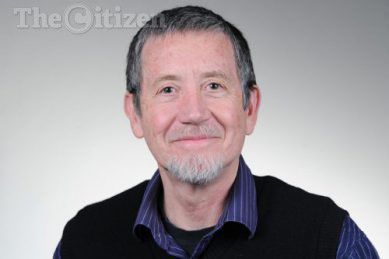What we need are leaders, rich or poor, who don’t steal because they know it’s wrong.

ANC Secretary-General Gwede Mantashe briefs the media on the outcomes of the special National executive Committee meeting at Luthuli House, 14 November 2017. Picture: Tracy Lee Stark
How do you interpret Gwede Mantashe’s explanation of why ANC president Cyril Ramaphosa won’t steal?
Here is what the party’s newly elected chairperson said: “We have a president who has money, who’s wealthy, who will not be tempted to steal… He is the president of the ANC. He is wealthy, he is rich. If he steals we will ask him ‘why do you steal, because you have enough?’”
One implication is that rich people don’t steal.
Also, people who “have enough” should not steal, with a further hint that if you don’t have enough, stealing is permissible.
At another level, there’s an assumption that because Jacob Zuma was relatively poor when he became president, he might have been tempted to steal.
And if he did steal, this would be excusable because he did not have “enough”. Who decides what’s enough?
In 2016, Atul Gupta was listed the seventh-wealthiest person in South Africa (estimated net worth R10.7 billion). Both Duduzane Zuma and his father are rich.
Their wealth did not prevent increased looting of public money. Even today, the Zuptas seek further self-enrichment.
Consider, for example, the reinstatement of dubious characters at Eskom, and the continued pursuit of a Russian nuclear deal.
These are perpetrated by rich people trying to squeeze out a few dollars more. Russian President Vladimir Putin, arguably the world’s richest man, uses his political power to amass greater wealth.
Greed generates its own momentum and is never satisfied. Let us agree: the idea rich people don’t steal is false.
We also need to correct the assumption that all ANC leaders are selflessly dedicated to serving the people. In comparison to those who came after him, ANC president Albert Luthuli was of humble means.
ANC “royalty” since then have done very nicely for themselves. Mantashe’s family name is not excluded from those accused of politically connected enrichment, featuring, for example, in a 2014 Sunday Times story about a R639 million Eskom catering contract.
Former ANC national spokesperson Smuts Ngonyama said in 2004: “I did not join the struggle to be poor.”
He was explaining his involvement in a BEE deal; the sale of a R6.6 billion Telkom stake to a consortium. Ngonyama made at least R160 million. This philosophy of “our time to eat” is part of ANC culture.
In September last year former KwaZulu-Natal premier Senzo Mchunu used the term when addressing the Moerane Commission investigating political killings.
In one of its many appropriations of Biblical mantles, the ANC in 2001 produced a discussion document titled “Through the eye of a needle?”
The title derives from Jesus’s assertion that it’s easier for a camel to pass through the eye of a needle than for a rich man to enter the kingdom of God.
The subtitle is: “Choosing the best cadres to lead transformation.”
Concern about the link between wealth and political office is obvious. Yet it’s not being rich or poor that matters.
Some people always want more than they have, and more than they have earned.
For them there is never enough. What we need are leaders, rich or poor, who don’t steal because they know it’s wrong.

Martin Williams.
//
Download our app




